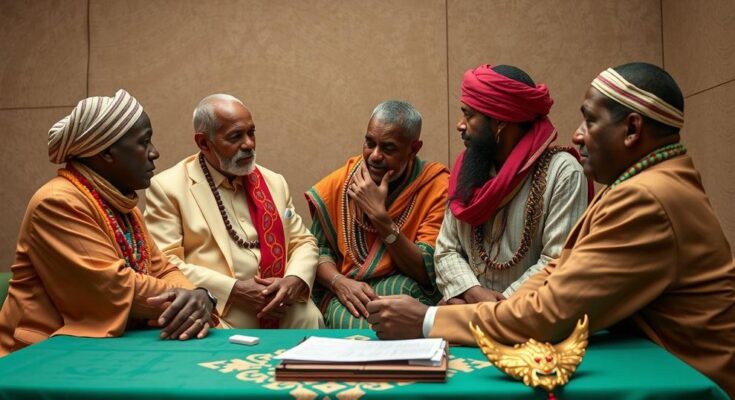Ethiopia has accused Somaliland’s security forces of fueling clan conflicts within its Somali region, particularly following violent clashes over grazing territory that resulted in numerous casualties. Despite Somaliland’s claims of non-involvement, there is substantial evidence suggesting military participation. A meeting between security officials highlighted the need for peaceful resolutions amid rising tensions linked to political changes in Somaliland.
Ethiopia has formally accused Somaliland’s government of engaging in and exacerbating clan conflicts that have erupted in Ethiopia’s Somali region. During a critical meeting in Jigjiga, security officials from both jurisdictions discussed the escalating tensions incited by recent clashes between two Somali clans over grazing rights, leading to fatal confrontations near the Somaliland border. The dispute has been highlighted by the tragic killing of Harshin woreda’s security commander, Mohamed Abdulahi Gedi, emphasizing the volatile security situation that has developed in recent days, with widespread reports of casualties among civilians and police personnel.
Sources indicate that as violence escalated, soldiers allegedly linked to Somaliland joined the confrontations, with officials from the Somali region implicating Somaliland’s military. Despite reassurances from Somaliland authorities claiming that those involved were non-governmental security operatives, Ethiopian officials have gathered evidence suggesting that these individuals were, in fact, disguised Somaliland forces.
A high-ranking official from the Somali region remarked on the substantial escalation of armed forces crossing the border, contributing to the complex dynamics of the ongoing dispute. Notably, a meeting chaired by President Hussein Hashi of the Somali region with senior military and security representatives took place to address the crisis. The Ethiopian Federal Police Commissioner General, Demelash Gebremichael, underscored the need for a peaceful resolution to the clan conflicts and highlighted the evidence of Somaliland military involvement in the violence.
The tensions are believed to be linked to the political transition following the recent resignation of former Somaliland President Muse Bihi Abdi. Despite his claims of non-involvement, influences appear to perpetuate the instability in the region. Meanwhile, while Somaliland troops remain active in the area, there are indications that the Ethiopian National Defense Forces are asserting control as they respond to the situation.
The conflict between Somaliland and Ethiopian regions has historical roots stemming from ethnic and clan divisions, primarily among Somali clans. Following Somaliland’s self-declared independence in 1991, it has maintained a relatively stable governance structure compared to neighboring regions of Somalia. However, tensions are strained with Ethiopia, particularly along the border where disputes have arisen over territory and resources. Recent accusations of military involvement by Somaliland indicate a potential shift in previously amicable relations between the two regional entities, necessitating an urgent dialogue to prevent further escalation.
The accusations by Ethiopia against Somaliland for escalating clan conflicts mark a significant turning point in their bilateral relations. The involvement of armed forces from Somaliland in internal disputes within Ethiopia’s Somali region signals an urgent need for diplomatic intervention. Both sides must prioritize discussions to ensure conflicts are resolved peacefully to maintain regional stability and uphold long-standing agreements intended to benefit both parties. The situation remains tense, and further engagement is crucial to avert violence.
Original Source: capitalethiopia.com




